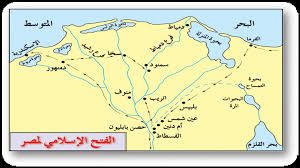Before the Opening-Battle:
The commandment of Prophet Muhammad to deal kindly with the Christian copts:
The Prophet of Islam’s (peace and blessings of Allah be upon him) mercy and tolerance in battles appears much in the opening battle of Egypt. Books of history tells that
“When ‘Amr ibn al-‘Aas, was about to open Egypt, he told its people saying, “Our Prophet, peace be upon him, had promised us to open Egypt, and commanded us to deal with its people kindly due to our kinship or affinity relationship (i.e. shared lineage). They replied to him that: Such kinship or affinity relationship due to lineage which dates back for old times was not to be preserved except by a real prophet (i.e. Prophet Muhammad)”.
It was narrated that the Messenger of Allah (peace and blessings of Allah be upon him) said: “If you open Egypt deal kindly with the Copts because they are abiding by a dhimmah (settlement/pact/ truce) and we have Rahim (kinship affinity relationship or) to them (Narrated by al-Bayhaqi).

“Our Prophet has commanded us to deal mercifully and kindly with you due to our shared Rahim (i.e. kinship or affinity relationship/ lineage).” (‘Amr ibn Al-‘As’s saying to Christian Copts before the Opening-battle in Egypt”
Ibn Kathir explains the word Rahim (kinship or affinity relationship) that Hajar (Ishmael’s mother) was Coptic. Others said that Abraham’s mother was Coptic (It is well known that Arabs are the descendants of Prophet Abraham).
He says, “Definitely both of them were Coptic. Explaining dhimmah (truce) he points out that Prophet Muhammad considered Al-Muqawqis’s, Egypt’s leader at the time, present, as peaceful treatment which should be considered as a truce with him.
The Opening-Battle of Egypt
From the first moment of the opening of Christian Egypt, ‘Amr ibn al-‘Aas, the leader of the Muslim expedite to Egypt, does not rush to fight its people. He rather, followed the tolerant Islamic legislation of the religion of Islam, which is not thirst for blood or to kill the innocent. He declares them to be safe, both: their lives and their homes, till they ponder over the matters between them and the Muslims.
The books Islamic history narrate that:
“When ‘Umar, the Muslim’s caliph, and Muslims completed the opening of Asham (the Levant), he sent ‘Amr ibn al-Aas to Egypt. He, moreover, sent Zubayr ibn al-‘Awam and Bishr ibn Artah, Kharjah ibn Hudhafah and ‘Umayr ibn Wahb al-Jumahi to accompany him.
They all gathered at the door of Egypt, and all met with Abu Maryam, the Catholicoi of Egypt, and Abu Mariam the bishop who was sent by Al-Muqawqis from Alexandria to support him, and protect Alexandria.
When they all met seeing each other, ‘Amr ibn al-‘Aas said to his soldiers, “Do not hurry until they have no excuse.” He, moreover, said “Both Abu Mariam and Abu Miriam the monks of this land should appear”, which they did. He said to them, “You are both the monks of this land: know that that God (Allah) sent Muhammad- peace be upon him- with the right and commanded him to follow it, and Muhammad, peace be upon him, has commanded us to follow it. He delivered all of the message he was ordered to deliver by God and passed away making all matters clear to us”.
Among that which he ordered us to do is that we should be patient with people until they have no excuse. Therefore, we call you to Islam. Those responding to our call, would be considered of our people and those who refused to adopt Islam, will be commanded to pay Jizyah (tribute) and would be protected.
Our Prophet has informed us that we would be victorious over you and open your land. He, moreover, commanded us to deal mercifully and kindly with you due to our shared Rahim (i.e. kinship or affinity relationship/lineage). If you respond to us and do not fight us, you will be safe throughout another truce.
Our leader has commanded us to deal kindly with the Copts because our Dhimmah and Rahim”. They replied to him that: Such kinship or affinity relationship due to lineage which dates back for old times was not to be preserved except by a prophet (i.e. Prophet Muhammad)”.
“She (Hajar) was the daughter of our king of Memphis. The people of Heliopolis invaded her and her people. They defeated them to be alienated and distracted. The daughter of the king was given to Abraham -peace be upon him. So welcome you and your Amir (prince). So please give us a pledge of safety until we come back to you”, they replied.
‘Amr said to them “I cannot not be deceived by anyone. I will delay you for three days so that you may discuss the matter among yourselves otherwise I will fight you. They replied , “Give us more days,”. He added to them one more day. They also asked him one more day , which he did.
They went back to Al-Muqawqis, Artabun who refused to respond to their message and ordered that the Muslims should be fought secretly. They (the two monks) said to the people of Egypt: “We will strive to protect you and do not return to them (i.e. respond to them)”. He said to them “There are still four days left (for the truce) so fight the Muslims”.
Their leader advised them to invade the Muslim secretly and deceive them. Noble-men among them reprimanded them for fighting the brave people (i.e. Muslims) who killed Caesar and Hercules and defeated them in their lands . Artabun insisted that the Muslims should be deceived and besieged.
They could not defeat the Muslims who Besieged Ain-Shams (Heliopolis) in Egypt on the fourth day. Al-Zubayr along with his soldiers mounted on the wall protecting them and invaded them.
They fled to the door to be met with ‘Amr who reconciled with them through a truce. Al-Zubair had control over the land. ‘Amr wrote to them a Book of peace (i.e. pledge or truce) which reads:
“In the name of Allah the Most Gracious, the Most Merciful: This is what ‘Amr Ibn Al-‘Aas has given to the people of Egypt including: the safety of souls, religions, their properties, their churches, their crosses, their sea and land. No one may interfere with anything of these or diminish those rights, The people of Egypt should give the Jizyah (A few amount of tribute) if they agreed to this truce and their river’s increase mounted to fifty million; they should only be charged an amount which should meet their protection.
If any of them refused to pay Jizya, an amount of Jizya would be deducted from the whole amount of jizya imposed on them and the truce between us and those refused to pay it would be revoked. If their river is less than the required amount, an amount of Jizya would be deducted according to it. The one refused such truce and wants to go out of the land or migrate so that s/he may not be under our rule, s/he may do and would be safe until s/he migrates.
In this book is the pledge of Allah and the pledge of his messenger and the pledge of the Amir of the believers and the pledge of the believers.
All of the people of Egypt adopted such a truce and they accepted reconciliation; soldiers then dispatched in Al-Fustat (Old Cairo). Abu Mariam and Abu Miriam then appeared to ask ‘Amr to free the captives who were captured after the battle. ‘Amr refused to free them and expelled the two monks out.
When ‘Umar b. Al-Khattab, the Muslim Caliph heard about the incident, he ordered that the captives at the time of fifth-days truce should be freed and the captives who fought and those who did not should not. Some books mentioned that ‘Umar ibn Al-Khattab gave the captives the choice either to revert to Islam to be free or join their people and also be freed on the condition that they pay the Jizya. Those fled captives who left and Muslims could not chase them were not to be chased to be forced to abide by this truce.
Some of the captives accepted Islam freely and others did not, to whom Muslims did not do harm. This how the truce between the Muslims and the Egyptian Copts was”.
This historical narration shows the Justice and tolerance the Muslims adopted represented in their leaders’ kind dealing towards the Egyptian Christian Copts. They gave them choice either to revert to Islam or adopt their religions making a truce between them and the Muslims which safes their lives and properties in recompense to a small amount of money called the Jizya which makes Muslims responsible to protecting them.
Such Justice also materializes in ‘Amr’s command that the amount of Jizya should be based on the amount of water of the Nile River so that the Copts may not be harmed at the times of drought.
It also materializes in Umar’s dealing with the captives ordering his leader not to rush to refuse to free them giving them the choice either to adopt Islam or to be freed on the condition of paying Jizya.
Thomas Arnold, the author of The Call to Islam, notes (According to him): “The rapid success of the Arabs is due, first of all, to the acceptance of the Christian people who hated the Byzantine rule and their unjust administration and their bitter hatred to the theologians (Monks and priests). Jacobites, moreover, who were the majority of the Christian population, were treated unfairly by the followers of the Orthodox doctrine of the court. “
Egypt’s Christian Coptic conquest represented the finest example of adherence to the human civilized values in times of wars and battles. The followers of the religion of Islam adhered to these noble Islamic principles even with enemies.
The provisions of contemporary human rights even find roots in the principles of Islam. It is the first religion to give the right to asylum. A Qur’anic aya reads,
“And if any one of the polytheists seeks your protection, then grant him protection so that he may hear the words of Allah. Then deliver him to his place of safety. That is because they are a people who do not know..”(9:6).
It is the religion which has protected innocent people, their lives, property and families.
The justice of the Muslim invaders of Egypt with the Christians of Egypt has made the Copts equal in the treatment before Muslim leaders along with their different sects (Malkani and Jacobites) who oppressed each other at the time whenever they took over rule.
 Arabic
Arabic English
English Spanish
Spanish Russian
Russian korean
korean

